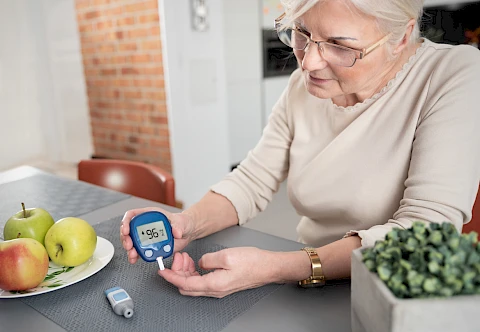
Diabetic neuropathy is a condition that affects many seniors living with diabetes. It involves damage to the nerves, which can lead to a variety of symptoms and complications. Understanding this condition is crucial for seniors and their caregivers to manage the symptoms effectively and maintain a good quality of life.
What Is Diabetic Neuropathy?
Diabetic neuropathy is nerve damage caused by high blood sugar levels associated with diabetes. Over time, uncontrolled blood sugar can damage nerves throughout the body but most often affects the legs and feet. Seniors are particularly susceptible because nerve damage accumulates over time. As a result, diabetic neuropathy is a prevalent condition among seniors with diabetes.
Types of Diabetic Neuropathy
There are several types of diabetic neuropathy, each affecting different parts of the body:
- Peripheral Neuropathy: The most common type affecting the feet, legs, and sometimes the hands and arms. Symptoms include numbness, tingling, and pain.
- Autonomic Neuropathy: Affects the nerves that control involuntary functions such as heart rate, digestion, and bladder function. It can cause digestive issues and low blood pressure.
- Proximal Neuropathy: Affects nerves in the thighs, hips, or buttocks, often leading to pain and weakness in the legs.
- Focal Neuropathy: A sudden, specific nerve damage that can affect any nerve in the body, often causing muscle weakness or pain.
Understanding these types helps in recognizing symptoms and seeking appropriate care.
Risk Factors for Diabetic Neuropathy
Several factors increase the risk of developing diabetic neuropathy. High blood sugar levels are the main risk factor, as constantly elevated levels can damage nerves over time. The duration of diabetes also plays a role; the longer you have diabetes, the higher the risk of neuropathy. Lifestyle factors such as poor diet and lack of exercise can contribute to the development of neuropathy. Other health conditions, including high blood pressure and high cholesterol, can also increase the risk. Managing these risk factors is key to preventing nerve damage.
Symptoms to Watch For
Recognizing the signs of diabetic neuropathy is crucial for early detection and management. Common symptoms include tingling, numbness, burning sensations, and sharp pains, typically starting in the feet and legs. However, symptoms can vary depending on the type of neuropathy.
For peripheral neuropathy, look for numbness, pain, or weakness in the extremities. Autonomic neuropathy may cause digestive problems, dizziness, or bladder issues. Proximal neuropathy often presents as severe pain in specific areas like hips or legs. Focal neuropathy can cause sudden pain or weakness, often in the head or torso.
Being aware of these symptoms and reporting them to your healthcare provider can lead to earlier diagnosis and more effective management strategies.
Prevention and Management Strategies
Managing diabetic neuropathy focuses on keeping blood sugar levels in check and making lifestyle changes. Regular medical check-ups are essential to monitor blood sugar levels and detect any changes early. Keeping blood sugar levels within the target range is crucial in reducing the risk of nerve damage.
Adopting a balanced diet and regular exercise routine can improve overall health and help manage diabetes. Your doctor may prescribe medications to manage pain and other symptoms associated with neuropathy. It's important to work closely with your healthcare team, who can provide guidance and support and tailor a care plan to your specific needs.
A comprehensive approach that includes blood sugar management, lifestyle modifications, and appropriate medical interventions is best for effectively managing diabetic neuropathy.
Care at Home for Seniors With Diabetes
Diabetic neuropathy is a common yet manageable complication of diabetes. By understanding the condition, recognizing symptoms, and staying proactive in managing your health, you can live a fulfilling life despite the challenges.
At Senior Helpers Santa Monica, we are here to support you with personalized care tailored to your needs. Contact us in Santa Monica, Los Angeles, Pacific Palisades, and Marina del Rey for compassionate care and assistance.